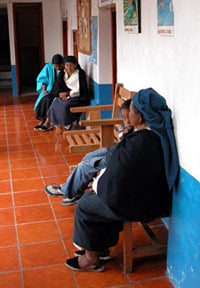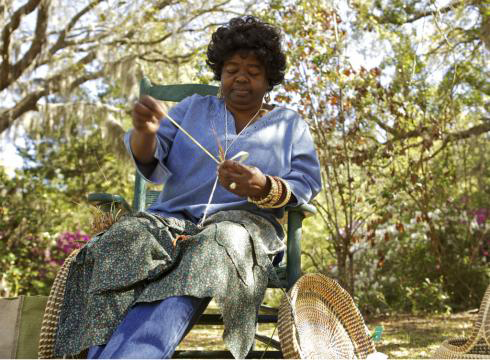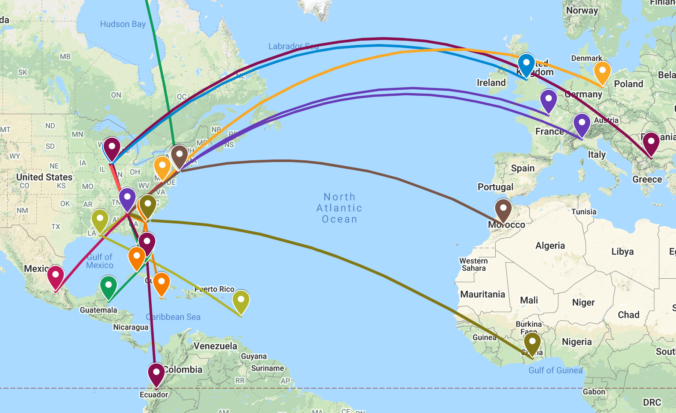Update March 8: As the class of 2024 is connecting with people, communities, and sites around the globe you can follow along by joining the ASC Global 2021 Facebook Group.
In a bit less than a week, Agnes Scott’s first-year class will begin their week-long Global Immersion Experience. Of course, no virtual learning format can substitute for the stimulation provided by physical travel. While the COVID pandemic forced us to abandon all actual travel, the creative and tireless work of the Journeys faculty leaders has resulted in a range of outstanding global learning opportunities that involve renowned international scholars and activists, bestselling authors, local community leaders, and innovative forms of synchronous and asynchronous engagement. We look forward to the time when the class of 2024 will be able to explore the world through study abroad travel. For now, we keep rooting for them as they lay the foundation for the global perspectives that will guide their learning.
Here are the topics of this year’s thirteen Journeys courses with a few examples from their virtual itineraries.

Journeys Astronomy and Discovery, led by Dr. Amy Lovell, will engage students in global learning by connecting with sites and communities in Florida and Puerto Rico. The Peak Week schedule includes 3D video tours of the Kennedy Space Center and the ISS as well as meetings with scholars and students from the University of Central Florida who work on the Arecibo Observatory in Puerto Rico. Workshops with Puerto Rican community representatives, with a historian of the Puerto Rican diaspora, and with local environmental groups in both Florida and Puerto Rico will enable students to learn about local and regional sustainability efforts.

Journeys Diversity and Health, led by Dr. Erin Bradley, provides students with insights into the public health system of Ecuador and Florida. During virtual visits and workshops with the Otavalo Health Clinic and the Chota Valley Cooperative in Ecuador, students will learn about indigeneous approaches to medicine. Conversations with the Overtown Green Haven Project in Miami will enrich students’ knowledge about the connection between environmental conservation and public health. Through virtual meetings with the Ecuadorian League of South Florida students will learn about the global cultural links between the U.S. and Ecuador.

The (Post)Colonial Legacies of global imperialism will be the focus of Dr. Philip Ojo’s course, where students will trace the connections between Martinique and New Orleans. Through virtual tours and presentations, students will engage with the history of enslaved people at sites such as La Savane des Esclaves on the French island of Martinique and the Whitney Plantation in Louisiana. In addition to the difficult history, students will also be able to engage with the globalized cultures that emanated from colonialism: online Mardi Gras performances and a cooking class about Cajun cuisine will conclude the schedule for this particular Peak Week experience.

Dr. Willie Tolliver’s Journeys course Fashion Capitals: Image and Industry will provide students with a unique behind-the-scenes look at the global fashion industry in New York City, Milan, and Paris. Meetings with representatives from Vogue and with renowned fur designer Linda Bretti, a guided tour through the Chanel museum in Paris, and a visit to the International Shoe Museum and the Silk Show in Como, Italy, will allow students to study the global links of the fashion industry in its respective cultural, historical, and political frameworks.

The artistic, cultural, and political legacy of Bulgaria and Eastern Europe are the focus of Dr. Mina Ivanova’s course Identity, Globalization, and Social Change. In virtual guided tours of Sofia and Plovdiv, students will be able to trace the long arc of Bulgarian history from its Medieval monasteries to Communism and to its membership in the European Union. Through online meetings with representatives of the Bulgarian Embassy and of Bulgarian cultural organizations students will be able to trace the global diasporic connections of Bulgarians in places such as Atlanta and Chicago.

Two global metropolitan sites, New York City and Beijing, frame the encounter with globalization in Dr. Rosemary Cunningham’s Journeys course Global Cities. Meetings and conversations with leading experts on China from the U.S. Consulate General and with scholars from Xi’an Jiaotong-Liverpool University provide students with an in-depth look at current affairs. A virtual tour of Beijing Exhibition Hall and the Tenement Museum in NYC will enable students to examine the migration history and the cultural connections between the US and China. Agnes Scott students will be able to discuss their observations in live virtual meetings with local college students in China and New Yorkers who assist in the permanent settlement of refugees from all over the world.

Global patterns that connect Chicago in the US and Liverpool and Manchester in the UK are at the center of Dr. Sarah Winget’s course Industrialization and Scientific Progress: Benefits and Costs. Virtual guided tours of the three cities and live discussions with community representatives and members of academic and industry groups provide students with an in-depth look at how the sites where modern industrialization began fare in the 21st century. A live online visit and discussion with representatives of the Argonne National Laboratory will enable students to gain insights into the workings of a multidisciplinary science and engineering research center.

In Global Journeys Islamic Art and Architecture, led by Dr. Roshan Iqbal, students will spend their Peak Week diving deep into global Islamic culture through a series of virtual immersion experiences. Experts on Islamic culture such as Princeton scholar Dr. Yumna Masarwa will introduce students to Islamic art before students attend workshops on calligraphy and geometric design where they learn to apply their calligraphy skills from practitioners of this renowned tradition. Hands-on cooking, music, and dancing lessons will round out the week-long program for this Journeys course.

Dr. Stacey Dutton’s Global Journeys course Marine Ecosystems examines global environmental issues by enabling students a close-up look at sites in Florida and Belize. Live virtual conversations with members of a coral reef restoration site and with rangers at a manatee habitat in Belize will be combined with workshops related to the Florida Keys Marine Sanctuary. Augmented reality virtual diving excursions, live conversations with scuba guides in Belize, and cooking classes will provide rich and meaningful learning opportunities for Agnes Scott students. At the end of the week, students will be able to discuss their learning with Belizean students and also learn about the Mayan history and culture in Belize.

The trans-Atlantic cultural and historical connections created by the global slave trade are at the center of Dr. Regine Jackson’s Journeys course Marronage, Freedom, and Resistance in the African Diaspora. By virtually connecting students with cultural institutions and communities in the Georgia and South Carolina Sea Islands and in Freetown, Sierra Leone, the course examines a series of global connections. Students will engage with leading scholars such as Dr. Marie Gibbs from the York W. Bailey Museum at Penn Center, the first US school for emancipated slaves, and historian Brian Brown, whose work on the history of coastal Georgia has been featured by the Smithsonian Museums, Buzzfeed, and The History Channel. Students will also connect virtually with students studying heritage tourism in Sierra Leone and participate in a virtual tour of the ruins of Bunce Island, the site of a former British slave trading castle.

The many cultural and historical links between the Georgia Sea Islands and Ghana feature prominently in Dr. Tracey Laird’s Journeys course Music, Art, and Community. A virtual guided tour will familiarize students with the history of the Igbo/Ebo people and their impact on the creation of the Gullah Geechee culture along the coast of South Carolina, Georgia, and Florida. This Journeys course will also feature several virtual meetings with Ghanaian community representatives, lessons in the languages of Ghana, and traditional music presentations.

At a time when the architectural legacy of the confederacy and the civil war has come under heightened scrutiny, Dr. Barbara Drescher’s Journeys course The Presence of the Past in Germany and the US will enable students a global comparison of different approaches to historical monuments and to the commemoration of traumatic histories. Augmented reality visits to the Holocaust Memorial and the Jewish Museum in Berlin, Germany, to the National Museum of African American History and Culture on the National Mall in Washington, D.C. will provide students with comparative insights into how societies deal with deep-seated national traumata. Live meetings with Black German writer and activist Sharon Otoo and internationally acclaimed author and philosopher Susan Neiman will enable students to discuss these topics with leading experts in the field.

Dr. Alan Grostephan’s Journeys course Migration and Art in the Open City will take a close look at the multifaceted cultural and historical links that bind New York City to places such as Mexico City and Bogotá, Colombia. Virtual explorations of sites such as the Palafoxiana Library in Puebla City, Mexico, will enable students to trace the cultural underpinnings of an emerging American culture. Through discussions and workshops with writers and scholars students will get to know a range of cultural perspectives, rounded out by virtual guided tours through various areas of New York City.
